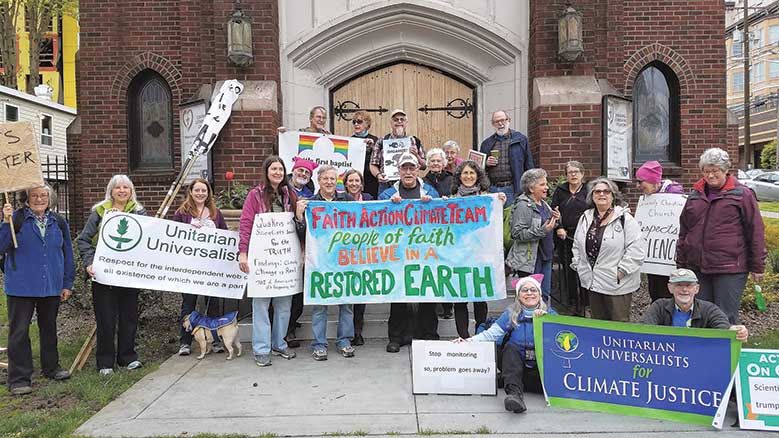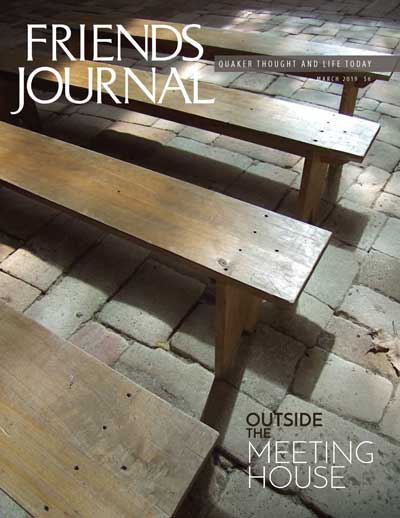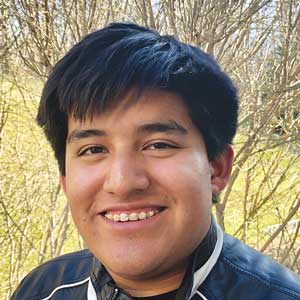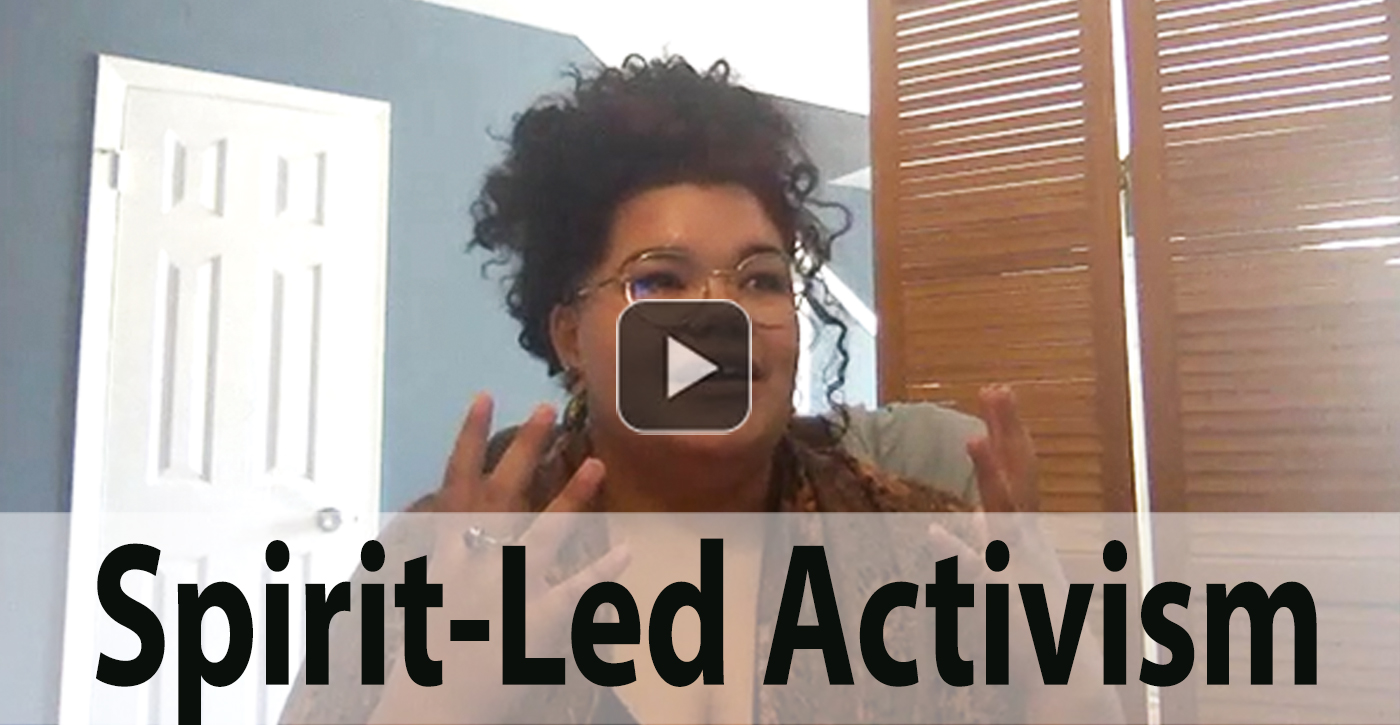
People often don’t know how to respond to climate change because the problem is so huge and involves so many aspects of how our societies are organized. Quakers are no exception. A complicating factor for Friends is our long history of activism in movements that addressed vital social issues. We feel we should do something, yet don’t know what. Through activism, we have taken Quaker beliefs outside our Quaker meetings. Climate change is an issue that will be solved outside Quakerism, and yet we should do something.
Having listened to many Friends talk about this, I believe that we also carry some confusion about how Friends have arrived at our historic corporate witnesses. There is a feeling that a few famous Friends (for example, John Woolman, Susan B. Anthony, and Alice Paul) inspired Friends to come to unity and speak with one voice. In reality, various Friends in different monthly and yearly meetings raised issues using different methods for many decades in ways that were not coordinated. It took a long time for yearly meetings to come into unity on slavery, and even then there remained a wide spread of opinions. Leaders within the Society of Friends were often considered “friendly nuisances,” and their opinions not popular. They were seen as a cause of friction, and sometimes even disowned. Their stock rose after the full Society adopted similar views.
I find that some Friends are waiting for a clear and detailed leading on climate before acting, or waiting for us as a Society to find unity on a way to take action on climate. I don’t think even John Woolman had a clear picture of the path toward successful abolition. He simply took on one piece that he was clear about: getting Friends to stop owning slaves (a huge undertaking in itself). None of the Friends that led inside of Quakerism or outside of Quakerism waited for the Society to first get clear on it. I want to share some thoughts about possible ways for individual Friends to act on climate right now.
There are many ways to make a difference, and we must each find the way that fits our own style.
What are Friends already doing?
There are a variety of approaches Friends are already taking to hold up the issue of climate change both within and outside of the Society of Friends. In Philadelphia, Friends have created Earth Quaker Action Team (EQAT), which first engaged in a focused five-year successful campaign to get PNC Bank to stop funding mountaintop removal. Now they have switched to a carefully crafted campaign to get PECO Energy Company (the local electrical utility) to commit to creating green jobs by transitioning energy generation away from fossil fuels to alternative energy sources. This approach has been based upon the lifelong work of George Lakey and his belief that activists should focus on the impacts that a problem (climate change) has on people, highlight those impacts, and put pressure on the group who is causing that problem. I encourage people to visit EQAT’s website for more information, including videos, and read Lakey’s latest book How We Win, which draws lessons for all of us.
Quaker Earthcare Witness, which has worked on many environmental issues, has attempted to network Friends across the country who are working on climate issues. They have produced educational materials on climate change and earthcare, and they produce a monthly newsletter that highlights successes people have had. See their website at quakerearthcare.org.
The Prophetic Climate Action Working Group of New England Yearly Meeting has based its actions in prayerful discernment about how to hold up the crisis of climate change to the public and, in the tradition of prophetic witness, inspire others to act. To that end, they have taken several actions, including civil disobedience, to try to awaken the Light in others.
Friends Committee for National Legislation has worked on lobbying the U.S. Congress, specifically working on building a bipartisan coalition (nicknamed “Noah’s Ark” by some, since members join in pairs of one Republican and one Democrat). The coalition has taken the stance that climate change is real, and is trying to form a basis for nonpartisan action; it also hopes to break the Republican stranglehold on its members speaking the truth on climate change.
Finding myself in a part of the country where none of these activities were happening and where no meeting was taking a specific action on climate change, I founded a local 350.org group. I know many Friends scattered around the country who have joined 350.org or Sierra Club chapters, or other secular groups in order to take action on the climate change.
Positively challenged by a comment from Quaker climate activist Jay O’Hara, I wound up, after leaving 350Seattle.org, accidentally cofounding an ecumenical group working on climate issues. I thought I was convening a one-time conversation for people from different faith groups around the question, “How do people of faith have a powerful moral voice on climate?” The discussion led to our creating a conference, and that lead to two and a half years (and counting) of ecumenical action on climate, including civil disobedience. So if you act in faith, you never know what will happen.
One can engage in direct action campaigns, educational campaigns, prophetic witness, lobbying, secular actions, or ecumenical actions. There are many ways to make a difference, and we must each find the way that fits our own style.
The bad news is there is no single solution to global warming. The good news is you can start anywhere in whatever sector you understand.
What does working on climate change mean?
Most of us start at a personal level in responding to climate change. We do things like change our light bulbs, buy a Prius, and bike more. But fairly quickly one becomes frustrated with that: solo action is not enough. We are trained by U.S. school systems to expect social change to come through the lobbying of Congress, but in this current political climate such a belief is a recipe for despair. Any careful reading of the history of social change would reveal that it actually takes movements of organized people for governments to change laws and policies.
It is true that climate change is huge, with many causes related to the ways we have organized our society. It’s affected by energy, transportation, agriculture, buildings, forestry, etc. There is both good news and bad news in this. The bad news is there is no single solution to global warming. The good news is you can start anywhere in whatever sector you understand and start to be part of the solution. This problem is so big that it will take millions of us working on it because it has taken millions to create the problem.
If you are not familiar with the book Drawdown, edited by Paul Hawken, I strongly encourage you to check it out. Finding that none of the big environmental groups had a clear road map of what changes would get us to a safe carbon level, Hawken gathered together a cadre of graduate students to study all kinds of possible solutions to climate change. They examined the specific amount of carbon each solution could draw down and the specific costs. They have three lists, which include what will be most effective and what they see as most immediately achievable. For anyone trying to figure out where to start, you are given both the information about what matters and the chance to notice what actually speaks to you.
The things we spend time on are the things we prioritize. We prioritize earning a living, time with loved ones, and our health. But there is actually time after those things.
But I don’t have any time.
People often tell me that they find my activism admirable, but they don’t have time. I do realize we all have bills to pay and interpersonal issues at work in our lives. I also understand that climate change is a strange sort of fire burning out of control. It’s not the immediate fire that makes you grab your kids, your pets, or your partner and flee the house. It is a fire that will have been burning for decades before reaching its eventual devastation. As a species, we are hard-wired to respond to immediate problems rather than to far-off ones. That had a survival purpose then, but now we are in a situation where if we do not prioritize this slow-moving disaster, it will be too late once things are unlivable. I think we owe it to all future unborn generations to try our darndest to be sure they can be born (if I hear one more person say, “Well, I’m too old; the next generation will have to solve it,” I will scream). It is not okay for the generations who have lived their whole lives creating carbon to bow out of the solution. There are even things people housebound and in poor health can do about climate change. I think we literally all have to die trying.
The things we spend time on are the things we prioritize. We prioritize earning a living, time with loved ones, and our health. But there is actually time after those things. Some of us have more time because of the privilege we have in economic realms. I believe that means we have greater obligation to contribute to solving this problem than do those with less of the privilege of free time. This may mean putting aside some things we have habitually done, or some recreational activities. We cannot just stay in our comfort zone and expect this situation to change.
Just see what is disquieted in you, what task is particularized in your heart, or tenderized there, and act on that.
Begin where you begin.
You can begin anywhere. You don’t have to know what will be successful. You don’t have to have a clear leading. As Thomas Kelly asked 75 years ago:
He, more powerfully, speaks within you and me, to our truest selves, in our truest moments, and disquiets us with the world’s needs. By inner persuasions He draws us to a few very definite tasks, our tasks, God’s burdened heart particularizing His burden in us.
Just see what is disquieted in you, what task is particularized in your heart, or tenderized there, and act on that. If you don’t feel like you know how to do it, find someone who does seem to know and support them. If you have a good idea, ask others to support you. As a famous Quaker saying goes: Live up to the Light that has been given to you, and more will be given. I did not know where convening an ecumenical group for a discussion would lead, but I knew I should, and it led to more things. Once you are in motion, more will be revealed to you; next steps will become clear. This is what faithfulness looks like.








Thanks to Lynne for encouraging all of us to engage on this issue of our times – it will indeed take all of us acting on many different levels. For inspiring examples of what Friends are doing about climate and all the other environmental crises we are facing, you can find them at https://www.quakerearthcare.org/publications , or request our newsletter, Befriending Creation, at https://secure.quakerearthcare.org/civicrm/profile/create?gid=17&reset=1 . Lynne was an inspiring presenter at our recent meetings in Tacoma, Washington – we appreciated hearing about her organizing in the Seattle area.
Shelley Tanenbaum, Quaker Earthcare Witness
Thank you Quaker Family of Friends….you send hope & turning it into action.
Quakers – and others – do many great things towards climate change activism, but no one ever mentions the immediate, obvious and massively-impactful thing we can all do: stop flying. Lynn mentions the campaign to get PECO to transition from fossil fuels to alternatives, so Quakers acknowledge the advice from the scientific community world-wide that fossil fuels are bad and we should use less. And what is the single greatest fossil-using activity that everyone casually continues to use? It’s aircraft. They spew vast emissions into our already-burdened atmosphere, an average of 16,000 planes EVERY DAY. If we stop flying, we can make a BIG difference (remember the clear skies after 9/11?). If we give up that holiday in an exotic location for our children’s future’s sake, we are making a huge and effective contribution, and everybody can readily do it: just don’t buy that ticket! Stay local, celebrate local. And for anything further away, start much more actively using the wonderful technological options that are out there: video conferencing, skype, live streaming. It’s obvious, isn’t it – so why are we not doing it?
One of the ways my family is acting on climate change is to have solar panels on our house. We are lucky, and have a south-facing roof. Now we have purchased an older model electric car, too. It gives me joy to drive a car powered by the sun! But that is only possible for folks with a home that faces south. Other actions are trying to eliminate single-use plastic, cut down on driving distances, use less energy, and…..speaking out politically to influence our country to combat climate change. I believe just saying, “no thanks, I don’t need a straw,” can help influence others to change, too.
love this article – thanks Lynne and thanks FJ. Very inspiring words to encourage us all to do something and to start somewhere. I think it is also important to be joyous about our actions and also not to criticise each other. Building community is one of the keys to making the transition we need to make and so encouraging each other in our own small and large actions is very important.
great explanation…
while many of us ponder & wait for inspiration from our Faith, from our Congregation and from our Creator…
The reality is:
We know what to do, it is inborn to each and every one…God given instinct dictates!